Did you know that in 2025, the global market for digital products reached an impressive $300 billion? And it’s expected to continue growing at a steady pace. The rise of digital products is not just a passing trend- It’s a thriving business model. Whether you’re selling ebooks, software, online courses, or even digital art, the opportunities are endless. But one question that many creators and entrepreneurs face is: Where can I sell my digital product? The answer lies in choosing the right eCommerce platform. So we can discuss the best eCommerce platforms for digital products.
We’ll explore each one in detail, covering features, pricing, and why they might be the right fit for you.
Let’s dive in!
TL;DR
- Gumroad is perfect for beginners due to its simplicity and low fees.
- Shopify is ideal for businesses looking to scale, offering robust tools and customization.
- WooCommerce is the best option for WordPress users who want to sell digital products on their existing site.
- Klasio can be your go-to platform for selling digital products, offering comprehensive features and scalability.
- SendOwl is great for simple digital file sales with automatic delivery and secure protection.
- Key factors to consider when choosing a platform include features, pricing, ease of use, customization, scalability, and security.
- Use this formula to evaluate platforms:
Platform Suitability = (Features + Pricing + Ease of Use + Customization + Scalability) x Security.
A Quick Overview of the Best eCommerce Platforms for Digital Products
| Platform | Best For | Key Features | Pricing |
| Gumroad | Best for beginners | Simple, commission-based model, instant digital product delivery, customizable pages, subscription models | 10% + $0.50 per transaction for sales through your profile or direct links. |
| Shopify | Best for sellers looking to scale | All-in-one solution, customizable checkout, advanced analytics, powerful integrations | Starts at $19/month |
| WooCommerce | Best for WordPress users | Seamless WordPress integration, unlimited digital products, flexible payment gateways, tax management | Free plugin (additional costs for hosting, themes, extensions) |
| Klasio | An effective overall platform for digital products | Customizable storefronts, automated delivery, subscription support, advanced analytics, secure protection | Free Plan Available. Pro plan starts at $49/month |
| SendOwl | Best for simple digital product sales | Automated digital delivery, affiliate programs, DRM, customizable checkout | Starts at: $39/month |
What is a Digital Product?
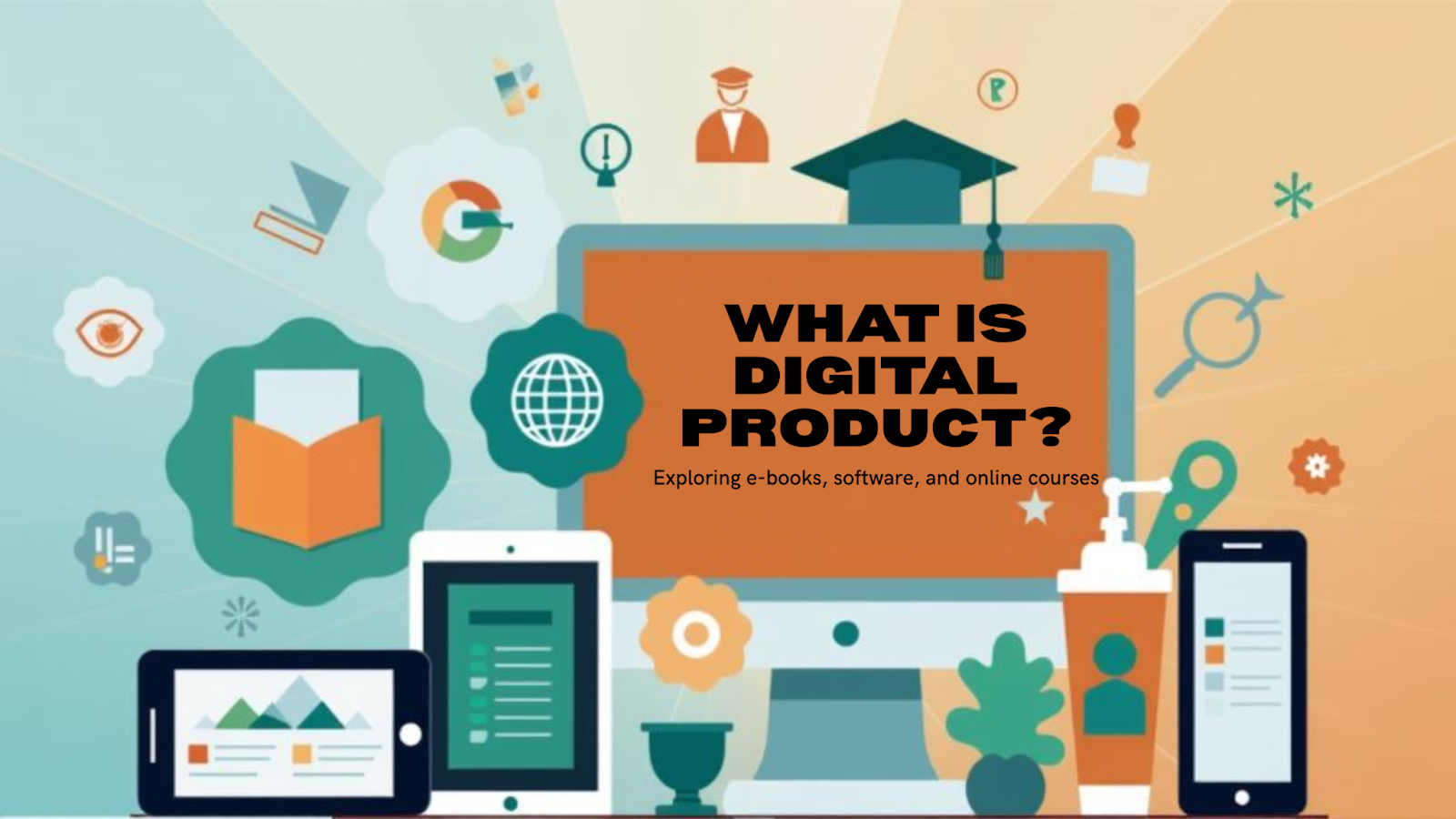
Before we explore the platforms, let’s take a moment to define digital products. Essentially, digital products are intangible items that are delivered electronically. These could include anything from ebooks, music, or videos, to software, templates, and online courses.
Some common examples of digital products include:
- eBooks and guides – Perfect for authors and experts sharing knowledge.
- Software and apps – Whether it’s a tool or a game, digital software products are hugely popular.
- Online courses – Video tutorials, text guides, or a mixture of both.
- Music and audio files – For musicians or sound creators.
- Digital artwork and photography – High-resolution images and designs.
- Membership and subscriptions – Digital access to exclusive content or services.
The beauty of digital products lies in their scalability. Once created, they can be sold endlessly without the need to restock or worry about logistics. You simply create it once, set up your sales page, and start making money! But first, let’s explore the platforms that can make this process smooth and profitable.
Let’s discuss the top 5 eCommerce Platforms for Selling Digital Products
We’ve handpicked the best eCommerce platforms for digital products, starting with Klasio. These platforms offer a variety of features, pricing options, and flexibility that cater to creators at all levels.
1. Gumroad – Simple and Effective for Beginners
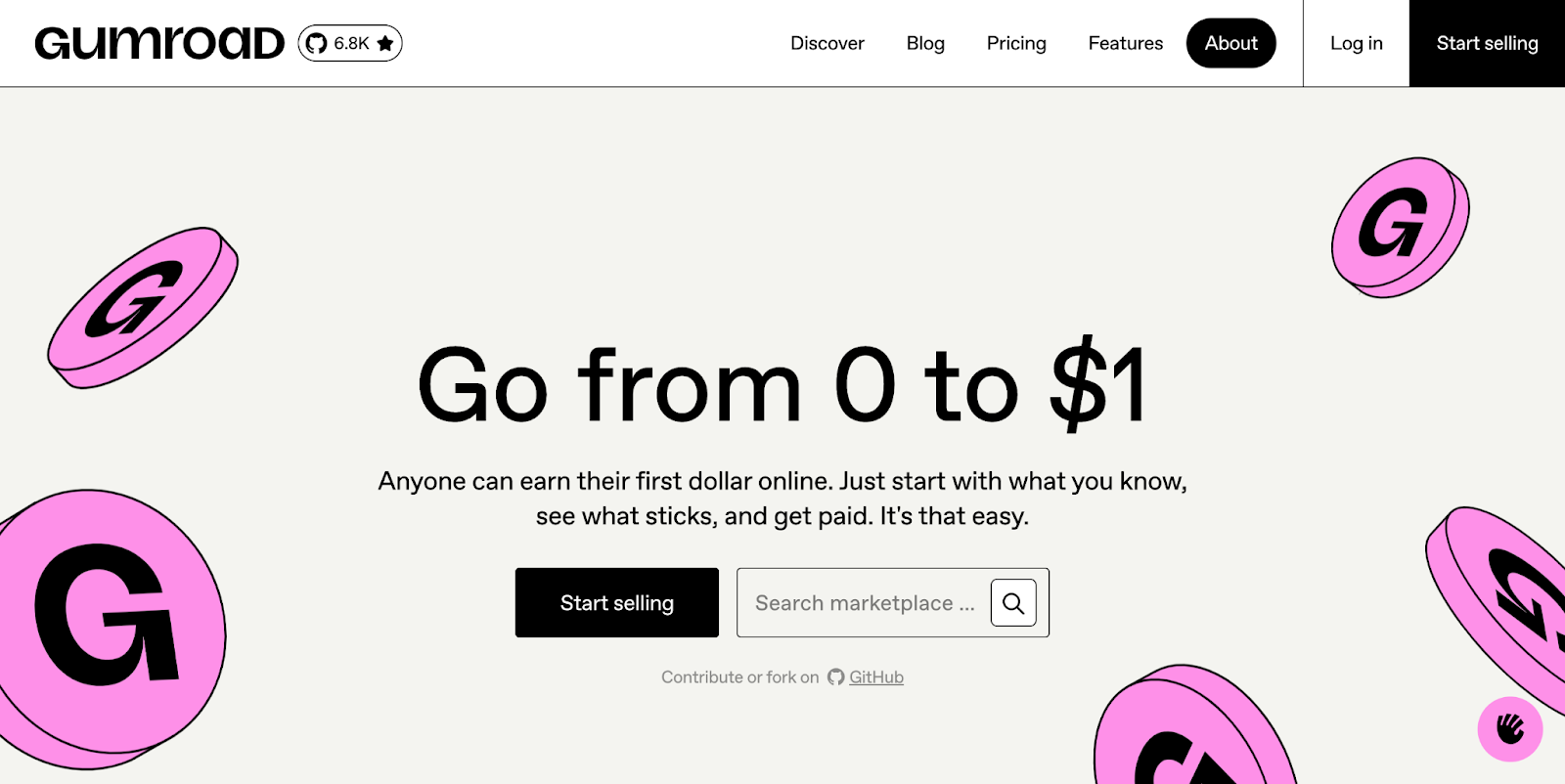
Why Gumroad is Great for Beginners
Gumroad is all about simplicity. This platform is designed for creators who want a no-frills solution to sell digital products. If you’re just starting out and need something fast and easy, Gumroad is a fantastic choice. It’s also very cost-effective, with no upfront fees or monthly subscriptions required.
Features:
- No Setup Fees: Gumroad only takes a small percentage of each sale, which means you don’t have to worry about monthly charges. It’s a commission-based structure, making it ideal for creators who don’t want to commit to a monthly subscription.
- Customizable Product Pages: You can easily upload your products, set prices, and customize the product page to reflect your style and branding.
- Instant Digital Product Delivery: Once a customer purchases, they instantly receive a link to download your product. This ensures that the transaction process is quick and hassle-free.
- Subscription Models: Gumroad supports subscriptions, which is perfect if you offer ongoing content or services (e.g., a monthly newsletter or digital content).
- Simple Payment Processing: The platform accepts payments via major gateways like PayPal and Stripe.
Pricing:
Transaction Fees:
- 10% + $0.50 per transaction for sales through your profile or direct links.
- 30% per transaction for sales made through the Discover Marketplace (when new customers find and buy from you).
Example: If you’re a musician selling digital albums, Gumroad allows you to quickly set up an album page, and your customers can instantly download the tracks after purchasing.
2. Shopify – Perfect for Sellers Looking to Scale

Why Shopify is Great for Growth
Shopify is one of the biggest names in the e-commerce space. Known for its versatility, it supports both physical and digital product sales. If you’re serious about growing your digital product business, Shopify provides all the tools you need to scale efficiently.
Features:
- All-in-One Store Solution: With Shopify, you can easily create a professional-looking store, customize it, and start selling digital products without hassle.
- Flexible Digital Product Management: You can upload and organize all kinds of digital files (ebooks, software, videos, music) and manage product variations with ease.
- Customizable Checkout: Tailor the checkout process for your customers to create a seamless experience that fits your brand.
- Advanced Analytics: Shopify provides in-depth reports and insights into your sales, allowing you to understand your customers and track your business growth.
- Powerful Integrations: Shopify integrates with hundreds of third-party apps, including email marketing tools, customer support apps, and payment processors.
Pricing:
- Basic: $19/month (billed annually)
- Shopify Plan: $49/month
- Advanced: $299//month
- Plus: $2,300/Month
Example: Let’s say you’re selling an online course or an eBook series. With Shopify, you can not only sell your digital products but also offer upsells and cross-sells, promoting additional content alongside your main product.
3. WooCommerce – The WordPress Plugin for Digital Products
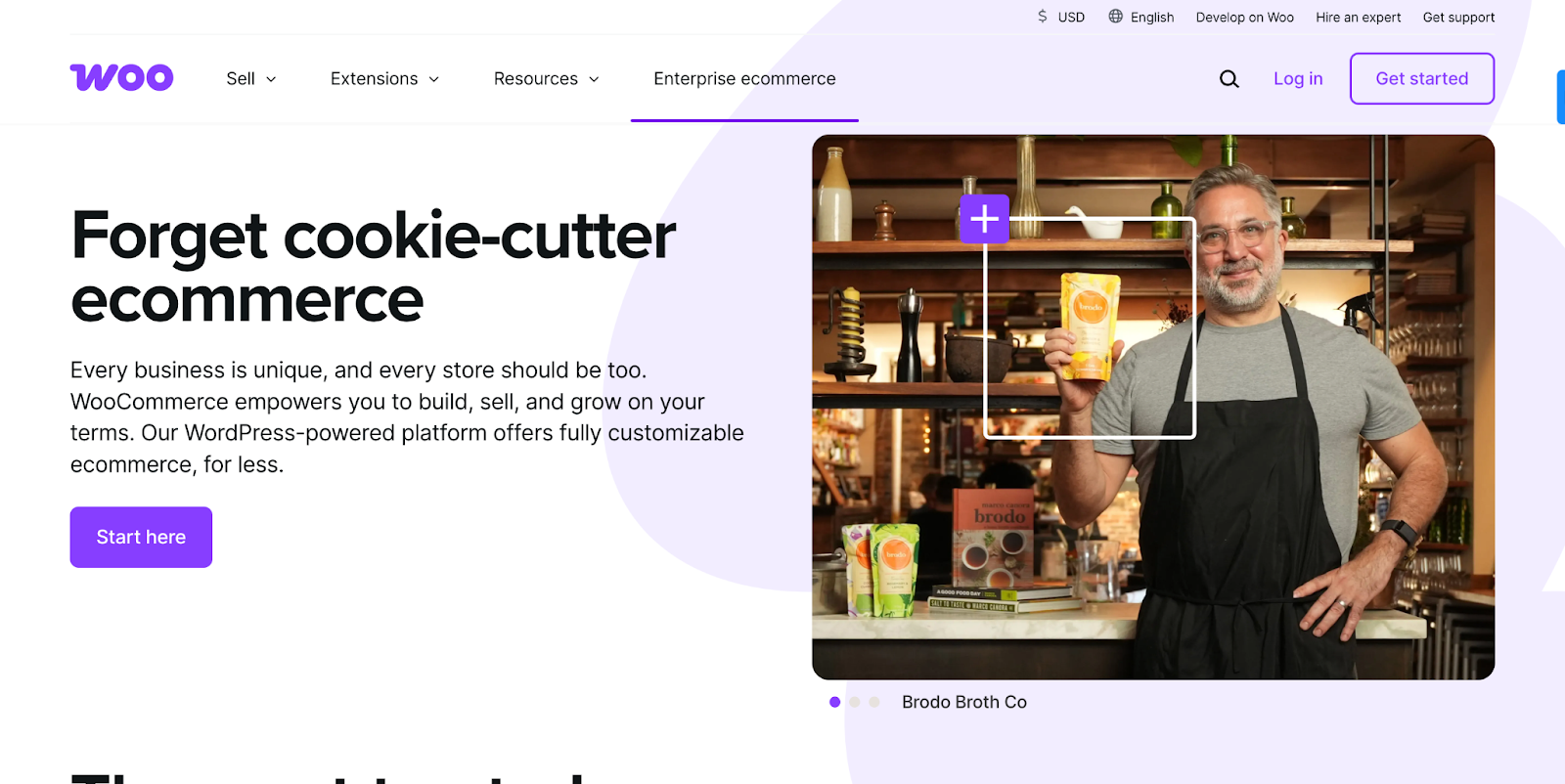
Why WooCommerce is Great for WordPress Users
If you already have a WordPress website, WooCommerce is a perfect choice. This open-source plugin is highly customizable and designed to sell both physical and digital products with ease.
Features:
- Seamless Integration with WordPress: As a WordPress plugin, WooCommerce integrates smoothly with your existing site, so you don’t have to start from scratch.
- Unlimited Digital Products: Whether you’re selling one product or 1,000, WooCommerce allows you to add unlimited digital products without any restrictions.
- Flexible Payment Gateways: WooCommerce integrates with PayPal, Stripe, and many other payment processors, giving your customers multiple payment options.
- Product Variations: Sell different formats of your digital product (PDF, MP3, etc.) or offer bundles.
- Tax Management: WooCommerce helps you calculate taxes for digital sales in various regions, which is especially useful for international sales.
Pricing:
- Free Plugin: The basic WooCommerce plugin is free, but you’ll need to pay for hosting, themes, and certain extensions (like payment gateways).
- Extensions: Paid extensions allow you to add more features like advanced analytics and subscriptions.
Example: If you already have a WordPress blog and want to sell digital products like guides or templates, WooCommerce will let you set up a professional store directly on your site.
4. Klasio – An Efficient Platform for Course Creators
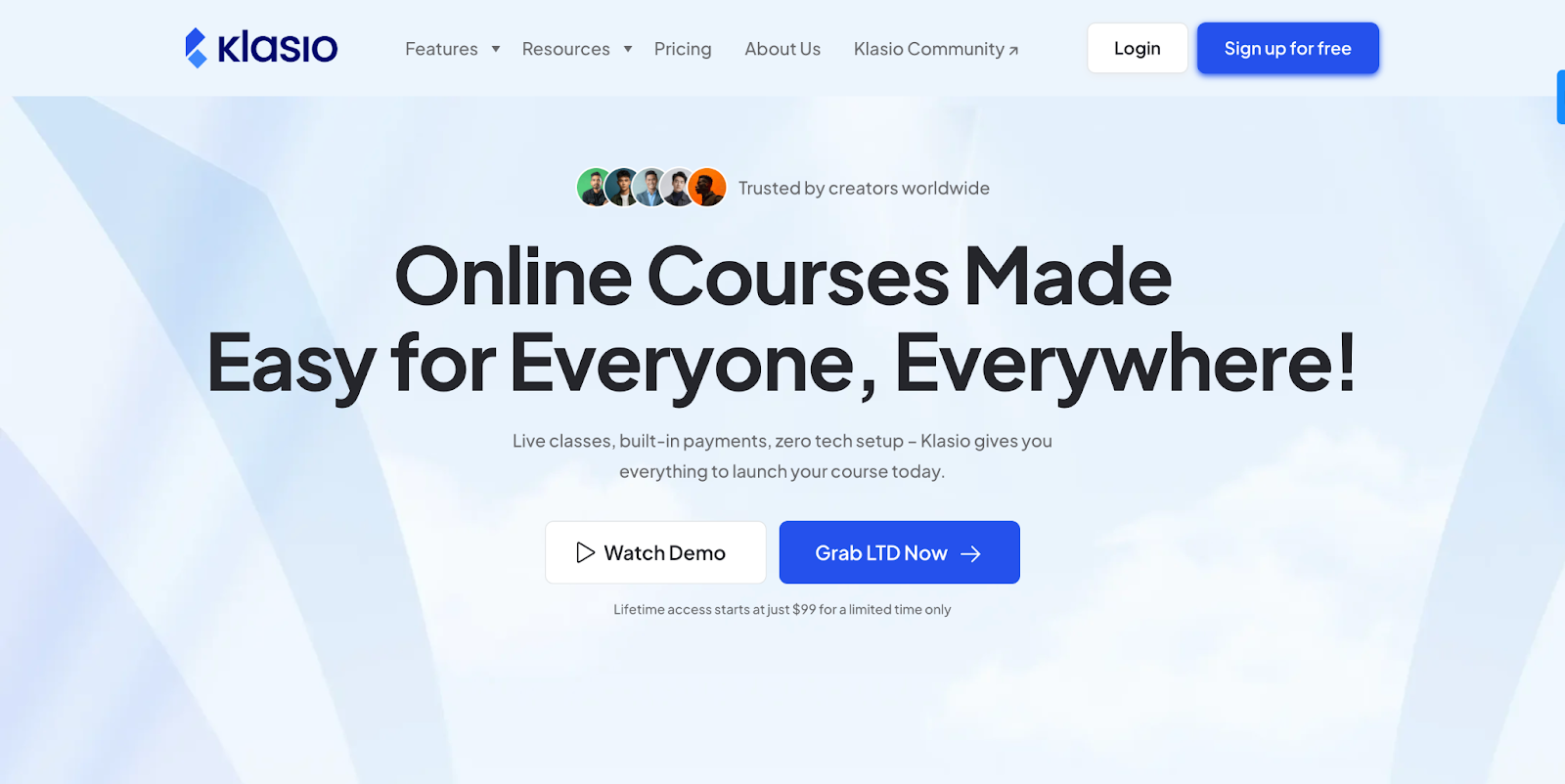
When it comes to selling digital products, Klasio can always be your go-to choice. This platform offers a highly intuitive, user-friendly interface that’s designed specifically for creators, entrepreneurs, and educators. Whether you’re selling an ebook, an online course, or a music album, Klasio has you covered with its powerful tools that make it easy to manage your products and interact with your customers.
Features:
- Customizable Storefront: Klasio offers several sleek, mobile-optimized templates that allow you to create a personalized storefront with no coding experience required. Whether you want a minimalist design or something more complex, Klasio lets you match your brand’s identity.
- Seamless Digital Product Delivery: No more manual sending! When a customer purchases your digital product, Klasio automatically delivers it to them, reducing your workload and making the process fast and efficient.
- Subscription Support: Perfect for creators who wish to sell on a subscription basis, whether it’s a monthly membership or recurring digital content, Klasio has built-in features for subscription management.
- Payment Integration: Klasio supports major payment gateways, including PayPal and Stripe, ensuring that you can accept payments from anywhere in the world.
- Advanced Analytics: Track sales, customer behavior, and marketing campaign performance with Klasio’s comprehensive reporting tools. This will help you optimize your strategies and boost sales over time.
- Secure Digital Product Protection: Klasio ensures that your digital content is protected with top-notch encryption, preventing unauthorized distribution.
Pricing:
- Free Plan: $0/month
- Starter Plan: $49/month.
- Growth Plan: $79/month
- Business Plan: $149/month.
Example: Let’s say you’re an educator who sells online courses. With Klasio, you can easily create a course storefront, set up automated email sequences to engage students, and track which lessons are most popular- all in one place.
5. SendOwl – Perfect for Simple Digital Product Sales
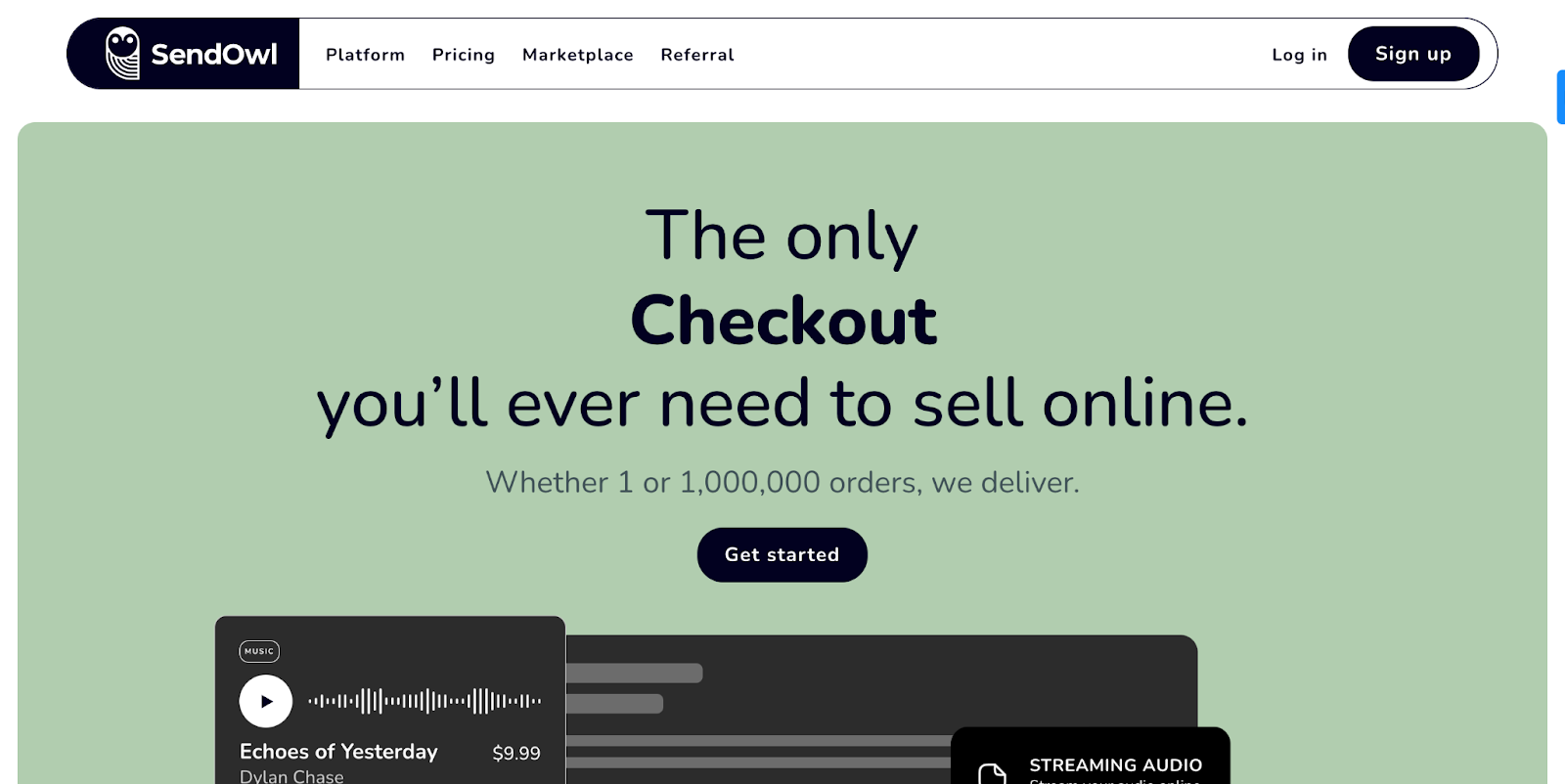
Why SendOwl is Great for Digital Goods
SendOwl is an excellent platform for creators who want to sell digital products without managing a full-fledged online store. It’s designed specifically for digital goods and focuses on making the selling process straightforward.
Features:
- Automated Digital Delivery: Once a customer purchases your product, SendOwl delivers the product automatically, freeing you from manual distribution.
- Affiliate Programs: You can easily set up affiliate programs to expand your reach and boost sales.
- Digital Rights Management (DRM): SendOwl protects your digital products from unauthorized sharing with built-in DRM.
- Custom Checkout Pages: Personalize your checkout flow to provide a seamless experience for your customers.
Pricing:
- Basic: $19/month (billed annually)
- Shopify Plan: $49/month
- Advanced: $299//month
- Plus: $2,300/Month
Example: If you’re a photographer selling digital prints, SendOwl makes it simple to deliver high-resolution images securely and without delay.
Criteria for Choosing the Right Platform from the best eCommerce platforms for digital products: The Formula for Success
Choosing the right eCommerce platform to sell digital products can be overwhelming, given the vast number of available options. To simplify this process, we can break it down into a formula that considers various factors important to your specific business needs. This will help you pinpoint the platform that best suits your goals, budget, and business model.
The Formula:
Here’s a straightforward formula you can use to evaluate different platforms for selling digital products:
Platform Suitability = (Features + Pricing + Ease of Use + Customization + Scalability) x Security
Let’s break down each component of this formula and explain how it can help guide your decision-making process.
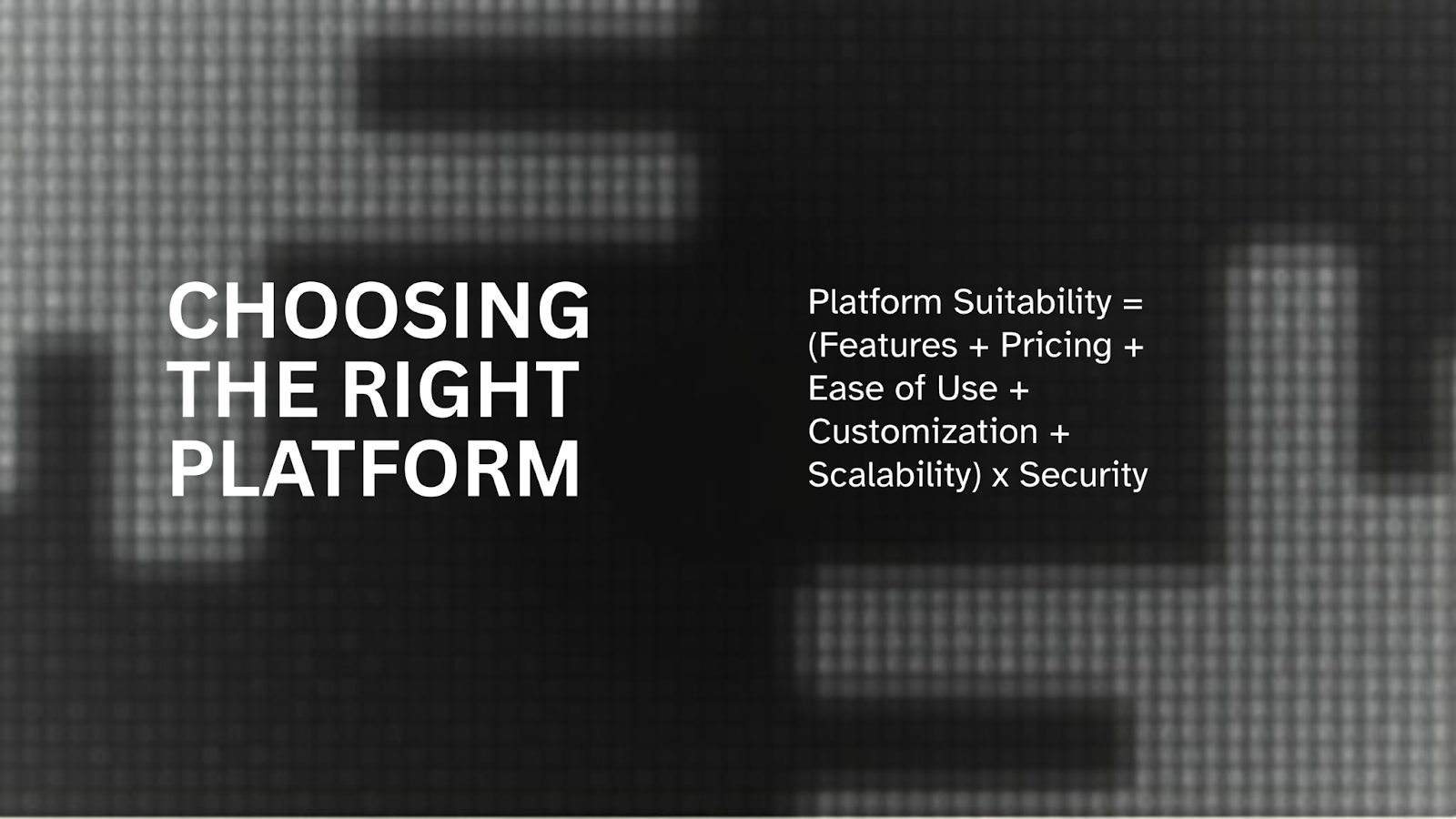
1. Features (F)
Features are the backbone of any e-commerce platform. Different platforms offer different tools, so it’s important to select one that aligns with your specific requirements. Consider the following:
- Product Management: Does the platform allow you to easily upload and manage your digital products? Can you offer product variations (e.g., different file formats, bundles)?
- Digital Product Delivery: How will the platform deliver your digital products? Can it automate the delivery process securely?
- Marketing Tools: Does the platform come with built-in tools for email marketing, discount codes, or affiliate programs to help grow your business?
- Analytics & Reporting: Does it provide useful data on your sales performance, customer behavior, and marketing efforts?
2. Pricing (P)
Pricing is another major factor to consider when choosing a platform. Each platform has its own pricing structure, so it’s important to assess which one fits your budget while providing the tools you need. When considering pricing, think about:
- Upfront Costs: Does the platform charge an initial setup fee, or is there a free tier?
- Transaction Fees: What percentage of each sale does the platform take? Some platforms take a higher percentage but offer more robust features, while others charge minimal fees but may lack advanced options.
- Monthly Subscription: Is there a recurring fee? Does the pricing scale with your business’s growth, or does it become more expensive as you add more products?
3. Ease of Use (E)
How user-friendly is the platform? This is especially important if you’re not particularly tech-savvy or you want to avoid spending time on complicated setups. Look for:
- User Interface: Is the platform intuitive and easy to navigate? Can you set up your store and manage your products without needing extensive technical knowledge?
- Customization: How much control do you have over the look and feel of your store? Can you easily create a custom website without needing to hire a designer?
4. Customization (C)
Your store’s design should reflect your brand identity. Choose a platform that offers customization options so that you can present your products in the best possible way. Key points to consider:
- Themes: Does the platform offer customizable themes that suit your product type and audience?
- Product Page Design: Can you tweak individual product pages to suit the content you’re offering?
- Store Design Flexibility: How much control do you have over the layout and design of your store?
5. Scalability (S)
As your business grows, your needs will change. It’s essential to choose a platform that can grow with you. Consider whether the platform offers:
- Unlimited Products: Does it impose limits on the number of products you can sell, or can you continue to expand your digital product line?
- Traffic Handling: Can the platform handle a surge in traffic as your business scales, especially if you experience rapid growth?
- Integrations: Does the platform support integrations with other tools you might need as you scale, such as email marketing services or analytics tools?
6. Security (Sec)
Selling digital products comes with the responsibility of protecting both your content and your customers’ data. Security should always be a top priority:
- File Protection: Does the platform provide digital rights management (DRM) or prevent unauthorized access to your files?
- Payment Security: Does the platform ensure secure payment transactions with encryption and compliance with global standards?
- Customer Data Protection: Is customer data, including billing information, stored securely and in compliance with data protection laws (e.g., GDPR)?
How to Use the Formula
Now that we’ve broken down the criteria, let’s see how the formula applies to real-world decision-making.
Step 1: Evaluate Your Needs
Ask yourself the following questions:
- What type of digital products are you selling? Are they courses, software, art, or something else?
- How much customization do you need for your storefront?
- Are you just starting out, or do you plan to scale quickly?
- What’s your budget for eCommerce fees?
Step 2: Score the Platforms
Give each platform a score (1-10) in each category based on how well it meets your needs. For example, if Klasio has all the features you need but is slightly more expensive than Gumroad, you might give Klasio a higher score in “Features” but a lower score in “Pricing.”
Step 3: Apply the Formula
Once you’ve scored each platform on the five key components (Features, Pricing, Ease of Use, Customization, and Scalability), apply the formula:
Platform Suitability = (F + P + E + C + S) x Sec
This will give you a final score that ranks each platform. The platform with the highest score is likely the best choice for you.
Frequently Asked Questions
1. What kind of digital products can I sell on these platforms?
You can sell ebooks, online courses, software, digital art, music, templates, and more.
2. Can I offer subscription-based digital products?
Yes, platforms like Klasio, Gumroad, and Shopify support subscription models for ongoing content.
3. Are there any upfront fees to use these platforms?
Most platforms, like Gumroad and SendOwl, don’t charge upfront fees. However, Shopify and Klasio have monthly plans.
4. Can I integrate email marketing with these platforms?
Yes, Shopify and Klasio offer integrations with email marketing tools, but WooCommerce may require plugins.
5. How secure are my digital products?
Klasio, Shopify, and SendOwl offer strong protection, including DRM and secure payment options to prevent unauthorized distribution.
Start Selling Your Digital Product Today With Klasio….
Selling digital products opens up exciting opportunities for creators, and choosing the right platform can significantly impact your success. Klasio, with its comprehensive features and ease of use, stands out as a suitable digital product for sellers. Whether you’re an independent artist or a business with large-scale operations, there’s a platform here that can meet your needs. This comprehensive guide on the best eCommerce platforms for digital products will help you choose the right one!
Remember, it’s important to pick a platform that aligns with your business goals, whether you’re just starting out or scaling to new heights. Good luck with your digital product journey!
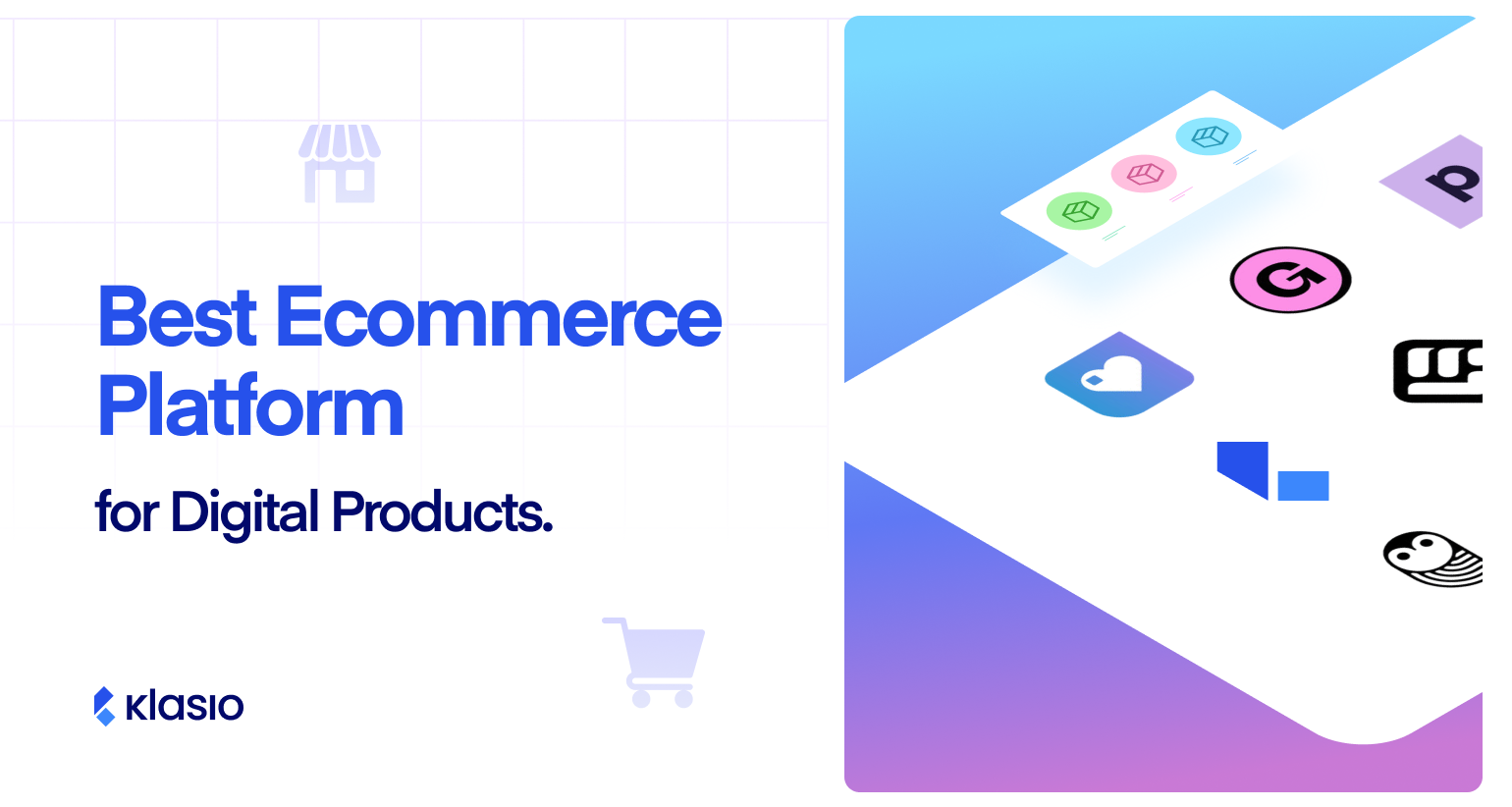
Leave a Reply